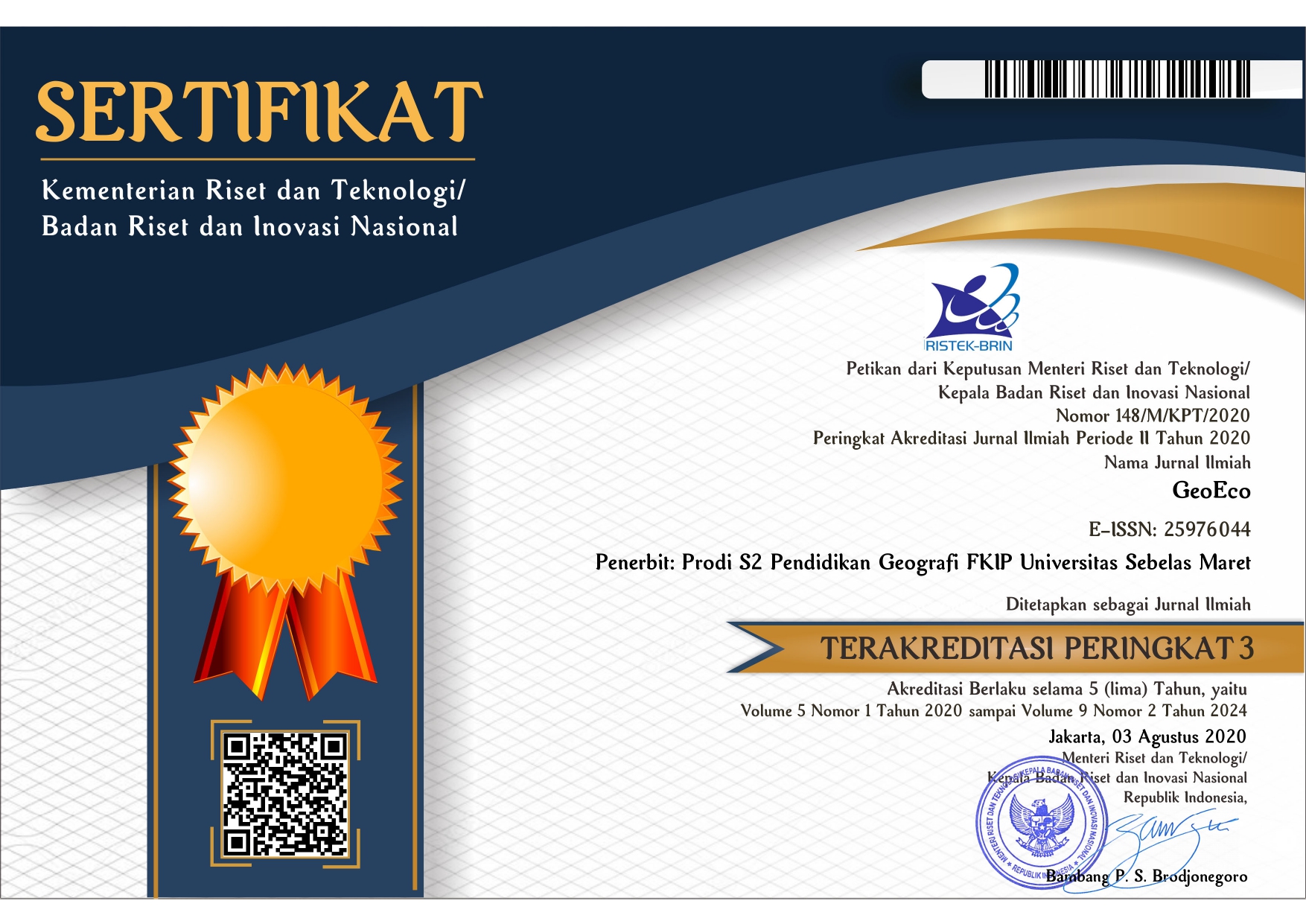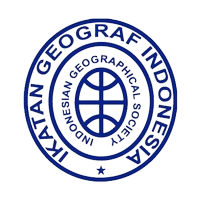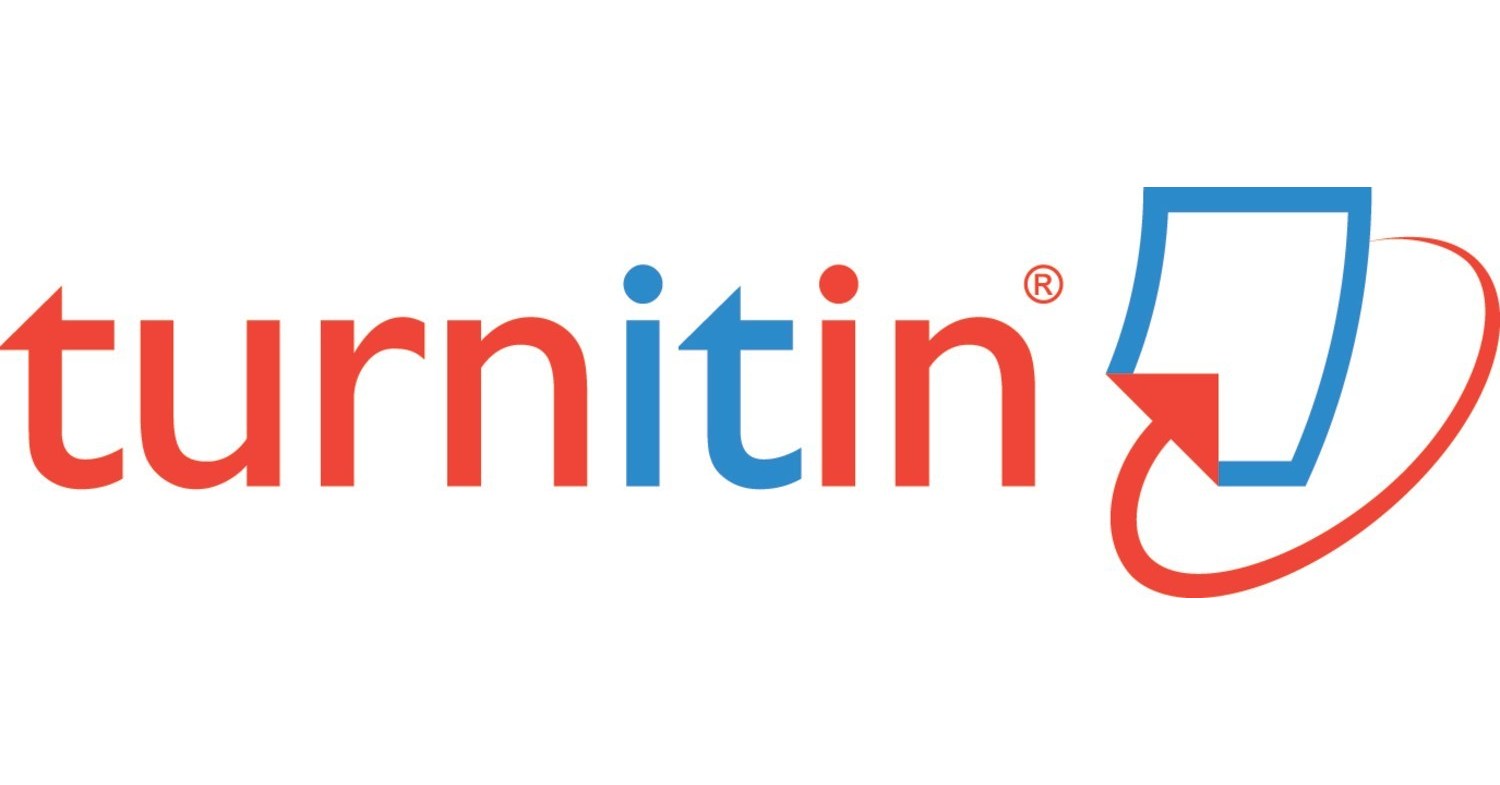EXPLORING THE USE OF BLENDED PBL IN GEOGRAPHY FOR ENHANCING STUDENTS’ ANALYTICAL THINKING IN THE “NEW NORMAL” CONDITION
Abstract
This study aims to explore a PBL model combined with the Edmodo platform on students' analytical thinking skills during a pandemic. This study used a quasi-experimental design with a control and experimental group. Participants in this study were students of class XI at SMAN 1 Suboh Situbondo, each class consisting of 15 students. Data collection was carried out after the application of the PBL model with blended learning assisted by Edmodo platform. Data obtained from the results of the pretest-posttest in control and experimental class with analytical thinking skills questions. Data analysis was carried out on the gainscore of students' analytical thinking skills with the help of SPSS 24 for Windows. The results showed that the gainscore in the experimental class was higher than the control class. Gainscore in the experimental class is 22.66 while in the control class is 14.66, thus there is a difference of 8 points. The results of data analysis in this research indicate the sig value of the independent sample t-test is 0.018 <0.05. This means that there is an effect of the implementation of PBL with the Edmodo platform on students' analytical thinking skills during the new normal condition.
Keywords
Full Text:
PDFReferences
Al-Said, K. M. (2015). Students’ perceptions of edmodo and mobile learning and their real barriers towards them. Turkish Online Journal of Educational Technology, 14(2), 167–180. Allen, Deborah E; Donham, Richard S; Bernhardt, S. A. (2011). Problem-Based Learning. New Directions for Teaching and Learning, 128(119), 21–29. https://doi.org/DOI: 10.1002/tl.465 Anthony, B. et all. (2020). Blended Learning Adoption and Implementation in Higher Education: A Theoretical and Systematic Review. In Technology, Knowledge and Learning (Issue 0123456789). Springer Netherlands. https://doi.org/10.1007/s10758-020-09477-z Argaw, A. S. (2017). The Effect of Problem Based Learning ( PBL ) Instruction on Students ’ Motivation and Problem Solving Skills of Physics. 8223(3), 857–871. https://doi.org/10.12973/eurasia.2017.00647a Arikunto, S. (2006). Dasar-dasar Evaluasi Pendidikan. Bumi Aksara. Bednarz, S. W., Heffron, S., & Huynh, N. T. (2013). A Road Map For 21st Century Geography Education. (A Report from the Geography Education Research Committee of the Road Map for 21st Century Geography Education Project), January 2013, 74. Dart, J. (2009). Learning And Teaching Guides Problem Based Learning In Sport, Leisure And Social Sciences. 1-8,35-36, 55–109. https://www.heacademy.ac.uk/system/files/ssg_pbl_casestudies.pdf Dziuban, C.et all. (2018). Blended learning : the new normal and emerging technologies. 1–16. https://doi.org/10.1186/s41239-017-0087-5 Hilliard, A. T. (2015). Global Blended Learning Practices For Teaching And Learning , Leadership And. 11(3), 179–188. Indonesia, R. (2013). Peraturan Menteri Pendidikan dan Kebudayaan Nomor 69 Tahun 2013 tentang Kerangka Dasar dan Struktur Kurikulum Sekolah Menengah Atas/ Madrasah Aliyah. Menteri Pendidikan dan Kebudayaan. Inel Ekici, D. (2017). The Use Of Edmodo In Creating An Online Learning Community Of Practice For Learning To Teach Science. Malaysian Online Journal of Educational Sciences, 5(2), 91–106. Kemdikbud. (2020). Penyesuaian Kebijakan Pembelajaran di Masa. https://www.kemdikbud.go.id/main/blog/2020/08/kemendikbud-terbitkan-kurikulum-darurat-pada-satuan-pendidikan-dalam-kondisi-khusus Meisandy, R. R. (2020). Perceptions Of High School Students In East Java Regarding Implementation Sfh During The Covid-19 Pandemic. JPIPS : Jurnal Pendidikan Ilmu Pengetahuan Sosial, 7(1), 28–36. https://doi.org/10.1886/jpips.v7i1.10354 Mendikbud. (2020). Pelaksanaan Kebijakan Pendidikan dalam Masa Darurat Penyebaran Covid-19. No.4. Nafiah, Y. N., & Suyanto, W. (2014). Penerapan Model Problem-Based Learning Untuk Meningkatkan Keterampilan Berpikir Kritis. Jurnal Pendidikan Vokasi, 4(1), 125–143. Oyelere, S. S., Paliktzoglou, V., & Suhonen, J. (2016). M-learning in Nigerian higher education: an experimental study with Edmodo. International Journal of Social Media and Interactive Learning Environments, 4(1), 43. https://doi.org/10.1504/ijsmile.2016.075055 Parta, I. N. (2016). Karakteristik Berpikir Analitis Mahasiswa Dalam Menyelesaikan “Masalah Sederhana.” ResearchGate. https://doi.org/10.13140/RG.2.1.4728.2167 Perdana, R., & Rosana, D. (2019). Relationship between Analytical Thinking Skill and Scientific Argumentation Using PBL with Interactive CK 12 Simulation. 1(1), 16–23. Purwanto.dkk. (2012). Pengembangan Modul. Depdiknas. Purwanto. (2009). Evaluasi Hasil Belajar. Pustaka Pelajar. Sandi, G. (2012). Pengaruh Blended Learning Terhadap Hasil Belajar Kimia Ditinjau Dari Kemandirian Siswa. Jurnal Pendidikan Dan Pengajaran, 241–251. Sanjaya, W., & Sanjaya, W. (2008). Strategi pembelajaran berorientasi standar proses pendidikan. http://library.um.ac.id/free-contents/index.php/buku/detail/strategi-pembelajaran-berorientasi-standar-proses-pendidikan-wina-sanjaya-34179.html Savery, J. . (2006). Overview Of Problem-based Learning : Devinition and Distinction Interdisciplinary. Journal Problem-Based Learning, 1(1), 9–20. https://doi.org/10.7771/1541-5015.1002 Savin-baden, M. (2000). Problem-based Learning in Higher Education : Untold Stories. SRHE and Open University Press. Sugiyono. (2016). Metode Penelitian Kuantitatif, Kualitatif dan R&D. PT. Alfabet. Susilo, A. et all (2020). Coronavirus Disease 2019: Tinjauan Literatur Terkini. Jurnal Penyakit Dalam Indonesia, 7(1), 45. https://doi.org/10.7454/jpdi.v7i1.415 Zubaidah, S. (2019). Pendidikan Karakter Terintegrasi Keterampilan Abad Ke-21. Jurnal Penelitian Dan Pengkajian Ilmu Pendidikan: E-Saintika, 3(2), 1–24.
Refbacks
- There are currently no refbacks.












.png)

